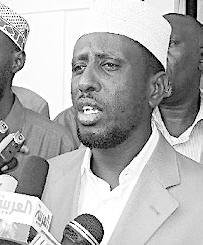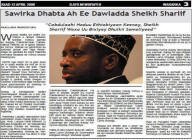 The mortars exploding in
Mogadishu have a recent precedent.
The mortars exploding in
Mogadishu have a recent precedent.
A month ago, artillery shells preceded the arrival of Sheikh Sharif Sheikh
Ahmed, the Islamist leader recently elected as President of Somalia.
He was flying into Mogadishu for the first time as head of state and the shells were meant to hit Villa Somalia, the state house in the capital.
The attack was not surprising at all considering the buildup of
opposition to Sheikh Sharif.
On February 3, a group of radical Islamists opted to join forces and
aggregate their political vision against him.
A Union of Islamic Courts (UIC) group affiliated with the Asmara-based exiled Islamist leader Sheikh Hassan Dahir formed the Xisbu Islaami (Islamic Party) after uniting with three other Islamist groups namely Mucaskarka Caanoole (Anole School), Somali Islamic Front and Ras Kamboni Brigade.
The declaration was communicated at a ceremony in Kismayu town, 500
kilometres south of Mogadishu.
Dr Omer Iman Abubakar, a hardliner Islamist was chosen to lead the Islamic
Party. Observers immediately pointed out that the group would be an obstacle
in the way of Sheikh Sharif. (A Transitional Federal Parliament meeting in
Djibouti on January 31 had elected him president.)
Neutralising radical groups
Besides, Al-Shabaab, the Islamist movement that controls most of the
Southern Somalia, is in no mood to support the man who was once the
undisputed leader of the Islamist movement in Somalia.
Confronting such formidable opposition is a task waiting, not only the new president, but also his choice for prime minister and the Cabinet. Many people expected the naming of Omar Abdirashid All Sharmarke on February 13 as prime minister and his endorsement by the Parliament a day later to tilt the balance in favour of the national unity government. Others wonder how President Sheikh Sharif, a local moderate Islamist and Sharmarke, a typical Diaspora Somali from North America could step out together to neutralise radical groups.
At the very least, the appointment echoes the Somalia of the 1960s. Omar Sharmarke is the son of Abdirashid Ali Sharmarke Somalia’s first post-independence prime minister named to the post in 1960. Sharmarke would become the country’s second president when, in 1967, he defeated Aden Abdulle Osman, the man under whom he served as a prime minister, in a contest at the then national assembly.
It is generally felt-that the senior Sharmarke lost the premiership in 1963 because of his daring initiatives to establish an amicable relationship with neighbouring countries even though Kenya wasn’t independent until December 12 of that year while Djibouti would be a colony until 1977. Nationalists beholden to the Greater Somalia politicians could not countenance his moves.
According to a Mogadishu political observer Nur Ali Fidow, the senior Sharmarke’s assassination in 1969 mostly had to do with his policy of friendship towards other countries in the Horn of Africa region. The Arusha Accord between Kenya and Somalia signed in 1968 was one of the landmark agreements that rubbed the premier’s enemies the wrong way.
As a sign good neighbourliness, Daniel arap Moi attended the burial of the Somalia leader as Kenya’s Vice President.
As the Kenyan delegation left for Nairobi, military officers led by General Mohamed Siad Barre, overthrew the civilian government and installed a 20 year dictatorial rule.

Somalia’s president Sheikh Sharif Ahmed
(above) addresses the press after arriving in the Capital
Mogadishu on Monday. A day later, Islamists opposed to his
government attacked AU peacekeepers.
|
“If the junior Sharmarke displays similar political tendencies as his late father, he will attract enemies in hordes, especially radical Islamists but win admiration from his people and for the Horn of Africa, especially if he manages to out-manoeuvre his opponents,” adds Fidow.
Ever since the beginning of 2008, Islamists competing for the control of southern and central Somalia gained ground against the Transitional Federal Government, a development that demoralised former President Abdullahi Yusuf Ahmed.
The moderate Islamists led by Sheikh Sharif captured parts of central Somalia and some sections of Mogadishu, the capital. More radical Islamists overran most of the southern Somalia, including the strategic Juba regions and now have substantial influence in the capital.
The fall of these economically and strategically important regions to radical Islamists has boosted their morale to challenge President Sharif’s government.
Most of the Lower Shabelle, Middle and Lower Juba including Kismayu – the most significant provincial capital – are controlled by groups with no appetite to compromise with former ally Sheikh Sharif and his breed of secular and Islamist partners in the government.
Beside, Gedo, Bay and Bakol regions are firmly in the grip of Al-Shabaab.
Significantly, these territories border both Kenya and Ethiopia.
President Sheikh Sharif’s visit to Mogadishu between February 7 and 10 was
seen as an opportunity for the national unity government to sell its
programme to the people.
When Sheikh Sharif was pronounced victorious in the January 31 election, he promised to seek the support of the Somali people, especially the groups opposed to the reconciliation that had been going on in Djibouti since June 2008.
As soon as the new President was in Villa Somalia, he invited government officials and community leaders. His intention was to explain that the enlarged Parliament from the previous 275 legislators to 550 MPs was meant to accommodate opposition figures and other individuals, mainly from the civil society who are important for the formation of the unity government.
Participants of the initial meetings in the presidential palace indicated that the leader had an ambitious reconciliation and nation building programme. Abdi Haji Gobdon, the spokesman of the Somali government, said that President Sheikh Sharif was offering his opponents the necessary space to talk about peace.
However, the opponents of the peace process were not silent. Their reaction to Sheikh Sharif’s election to the presidency and his first visit to Mogadishu was negatively loud and clear, comparing his government to that of his predecessor, Abdullahi Yusuf Ahmed.
Not mincing words
Dr Omar Iman Abubakar, the Xisbu Islamic leader was quick to hold a press conference on February 7 at former Pasta Factory in North Mogadishu, a position formerly held by a unit of the Ethiopian troops. In the presence of his loyalists, the Islamist leader declared his opposition to the new government.
“There is no difference between Abdullahi Yusuf’s (former president) government and the one currently being instituted by Sheikh Sharif,” said Dr Omar. If we opposed Abdullahi Yusuf in the past four years, we must also oppose this one as we see no difference,” he added.
Dr Omar was not mincing his words when he accused Sheikh Sharif of leading a secular government instead of a Sharia-based one.
“We are going to fight him (Sheikh Sharif) even if his formula is welcomed by fellow citizens,” warned Dr Omar. “Some people in this country even welcomed the Ethiopian troops,” said Dr Omar to justify his distaste for some of the people who have formed the government in collaboration with President Sheikh Sharif.
In the week between his election to the presidency and his visit to Mogadishu, Sheikh Sharif flew to Addis Ababa on February 2 for the African Heads of States Summit.
News of the Somali President’s participation in the AU Summit, his sidelines meeting with other Igad leaders and exchange meetings with world dignitaries, including Ban-Ki-Moon, the UN security council secretary general, was viewed as a good start.
That the AU Summit concentrated on plans to form a future African Union Government exposed the new Somali president to real pan-African politics. Meeting with the new AU Chair, Colonel Muammar Gaddafi, a seasoned pan-Africanist, provoked Sheikh Sharif to declare his vision for a peaceful Horn of Africa region.
“We Somalis want to live in peace with other nations in the Horn of Africa region,” said Sheikh Sharif. The statement was welcomed by the leaders of the other Igad countries, particularly Kenya, Djibouti and Ethiopia.
At the AU Summit, fellow leaders from other African countries and beyond understood that the new Somali President was upholding the principles of the Transitional Federal Charter that was framed at the end of the Somali Reconciliation Conference at Mbagathi, Nairobi, Kenya in 2004.
However, his opponents at home accused him of abandoning the Islamist agenda and compromising the principles of an Islamic state in Somalia in favour of a secular government.
Sheikh Hassan Mahdi, spokesman of the Islamic Party, accused Sheikh Sharif of selling out his ideals. Sheikh Mahdi insisted that the merger between the secular politicians and the Islamists led by Sheikh Sharif was a setback for the Islamist movement in Somalia.
“Sheikh Sharif and his followers have abandoned the noble idea the moment
they merged with the regime of the Murtadeen” said Sheikh Mahdi. Murtadeen
is Arabic for those who abandon Islam.
Sheikh Sharif ‘s supporters reject the idea that they are sell-outs to
secular politicians. They neither accept the notion that secular politicians
are Murtadeen.
“They cannot be called or classified as Murtadeen because the Transitional Federal Charter upheld by the secular politicians is a document that is religiously acceptable, despite its shortcoming,” says Sheikh Ahmed Abdullahi Disso, a moderate Islamist in Mogadishu, adding that consensus between Islamists and secular politicians is in the national interest.
“What is important is that documents whether at national, organisational or even family level don’t promote anti-Islamic teachings like promotion of alien religions and strange habits such as drug abuse,” adds Sheikh Disso.
Burundian contingent attacked
Radical Islamists however, oppose such open-minded approach as simplistic. They insist that the Quran and the citations of Prophet Mohamed constitute the only pillars of an Islamic state in Somalia.
“There is no question that groups opposed to Sheikh Sharif’s new national unity government are determined to challenge government forces, peacekeepers, liberal groups, humanitarian agencies and any group that offers a semblance of recognition such as collaboration or support,” says a legislator who spoke anonymously for fear of reprisals by the Islamists.
“The worst will come when those groups employ their suicide missions, bombing spree, character assassinations and other sinister tactics,” he added.
(This came to pass on Tuesday when Al-Shabaab suicide bombers attacked a
contingent of Burundian peacekeepers serving with the AU peacekeeping force,
Amisom, leaving 20 dead.)
Before the Tuesday attack, civilians had been killed and displaced during
attacks on Amisom peacekeepers and now the Islamists have captured Hudur 500
kilometres southwest of Mogadishu.
The stage is set for further confrontation as Eastern African states under the auspices of Igad push for more (10,000 ) peacekeeper even as Al Shabaab and the Islamic Party view them as heathen occupation force forces.
As neighbours do their habit, President Sheikh Sharif’s support from moderate religious groupings will go a long way to shore up his government. More so support from the Ahlu Sunna wal-Jamea which includes the Sufiya sect and clan militias.
The fact that the Puntland Authority in North-eastern Somalia supported the nomination of Sharmarke as PM is a bonus that Sheikh Sharif could count on. Also, the AU is promising to double Amisom from the 3,400 Ugandan and Burundian troops.
Nigeria and other African states are preparing to join Amisom. AU’s (then OAU) first undertaking in Somalia in the early 90s ended when clan militias and improper international peacekeeping coordination forced the United Nation’s Operation in Somalia, Unisom, to suspend its intervention in May 1995.
Ahmedou Ould-Abdalla is the UN Secretary General’s Special Envoy to Somalia who mediated the reconciliation talks that narrowed the difference between moderate Islamists and the secular politicians.
Can he also lobby support for the national unity government? It remains to be seen.
Africa insight is an initiative of the Nation Media Group’s Africa Media Network Project.
Source: http://www.monitor.co.ug/










